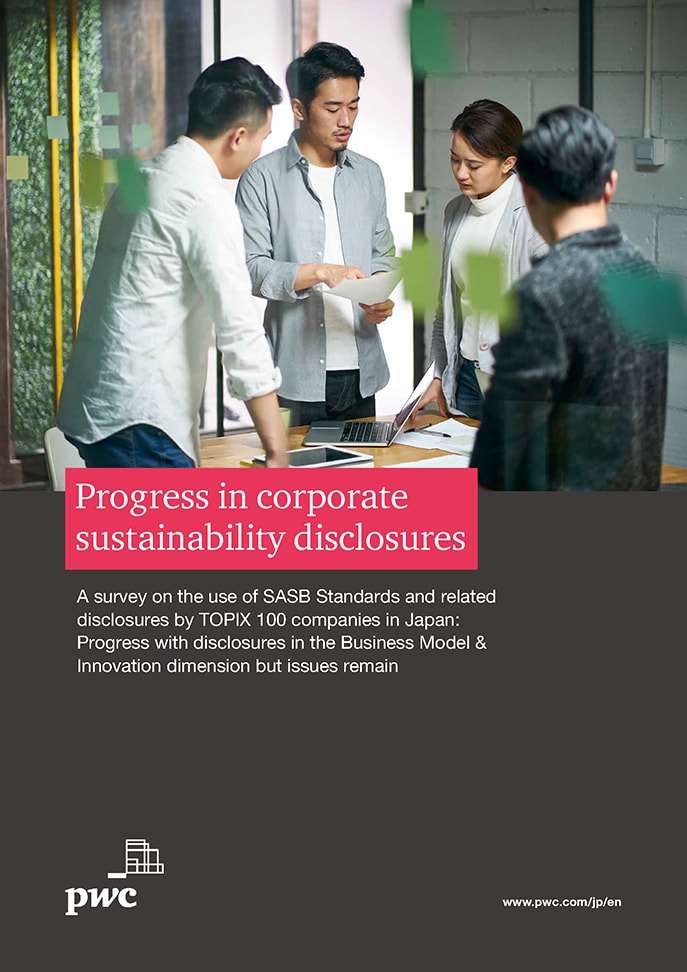
Use of SASB Standards
53 using the standards; 34 creating an index
Continuing the trend from last year, more than half of TOPIX 100 companies (53) are using the SASB Standards, and about two-thirds of those companies (34) have also provided a SASB content index.
Materiality assessment
Up from 71% to 76%
Material issues identified in the materiality assessments of TOPIX 100 companies are aligned with 76% of the industry-specific disclosure topics in the SASB Standards, an increase of 5 percentage points from 71% last year.
- In terms of dimensions, some progress has been made. Leadership & Governance was a notable example of progress that the survey identified, but at 53% the result is still considered low alignment, which may be a sign that this topic is not yet being adequately considered within the scope of discussions on materiality assessments at TOPIX 100 companies.
Disclosure of metrics
Up from 42% to 50%
Fifty percent (50%) of the metrics required by the SASB Standards were fully or partially disclosed on by TOPIX 100 companies, 8 percentage points up from 42% last year.
- Disclosure increased especially on two dimensions: Business Model & Innovation, and Leadership & Governance.
- The SASB Standards call for disclosure by TOPIX 100 companies on a large number of metrics for Social Capital, and for Business Model & Innovation, so just as we found in last year's survey, there is still a lot of room for improvement on these dimensions.
Progress in corporate sustainability disclosures
In June 2023, the International Sustainability Standards Board (ISSB) of the IFRS Foundation issued its first set of standards, IFRS S1 General Requirements for Disclosure of Sustainability-related Financial Information, and IFRS S2 Climate-related Disclosures.
The two ISSB standards reference the SASB Standards developed in part by the Value Reporting Foundation (VRF), which has been integrated into the ISSB.
The Sustainability Standards Board of Japan (SSBJ) was established in July 2022, and since then it has been developing domestic standards that are consistent with the IFRS Sustainability Disclosure Standards.The evolution of these standards is expected to have a significant impact on corporate sustainability disclosure in Japan.
The purpose of this survey was to clarify the current status of sustainability disclosure by Japanese companies and related challenges, by surveying the extent to which disclosure by TOPIX 100 companies is aligned with the SASB Standards.
As the industry-based SASB Standards are being incorporated into the development process for the ISSB standards, our findings will also help to clarify how well Japanese companies will be aligned with the anticipated domestic sustainability disclosure standards. By deepening our understanding of the areas where Japanese companies are successfully addressing the SASB Standards today and where there is still room for improvement, this survey provides information to assist Japanese companies and all investors in responding to future changes in standards.
Key findings
The SASB Standards are referred to or used by 53% of TOPIX 100 companies. About two-thirds of those companies provide a SASB content index. (Section 1)
As with last year, the survey found that over half of the TOPIX 100 companies (at 53 companies this year) are using the SASB Standards. About two-thirds of them (34 companies) published a SASB content index, an increase of more than 40% from the 23 companies in last year's survey.

Alignment has improved between TOPIX 100 company materiality assessments and key sustainability issues (disclosure topics) in the SASB Standards. (Section 2)
Seventy-six percent (76%) of the topics indicated in the SASB Standards were identified as material issues in the materiality assessments in TOPIX 100 companies’ disclosures, up from 71% in last year's survey.
It is important for companies to follow their own approaches to analyse the medium- to long-term external environment and identify material issues, therefore it is not always absolutely necessary for them to fully align with the material issues for their sector as identified in the SASB Standards.
However, as with last year, this year’s survey again clearly shows that the key sustainability issues identified by Japanese companies through their materiality assessments are very closely aligned with disclosure topics as identified in the SASB Standards.
In terms of dimensions, some progress has been made. Leadership & Governance was a notable example of progress that the survey identified, but at 53% the result is still considered low alignment, which may be a sign that this topic is not yet being adequately considered within the scope of discussions on materiality assessments at TOPIX 100 companies.


TOPIX 100 companies have increased their reporting on key metrics in the SASB Standards. (Section 3)
TOPIX 100 companies fully disclosed 6.5% of key industry-specific metrics that are called for by the SASB Standards, partially disclosed 43.5%, and had no disclosure at all on 50%. Full or partial disclosure increased by 8 percentage points to 50%, up from 42% last year.
However, the results vary widely according to factors such as issue category and industry. In addition, where metrics were not disclosed, the reasons for having no disclosure appear to be related to the characteristics of those metrics. This observation is similar to observations made last year.
Disclosures increased particularly on two dimensions: Business Model & Innovation, and Leadership & Governance. The SASB Standards call for disclosure by TOPIX 100 companies on a large number of metrics for Social Capital, and for Business Model & Innovation. Just as we found in last year's survey, there is still a lot of room for improvement on these dimensions.


This report is a translation of ‘サステナビリティ情報開示の進展’, originally published by PwC Japan Group in September 2023. Although we have made every effort to provide an accurate translation, in the event of any differences in interpretation between this translation and the original, the original takes precedence.
Download


